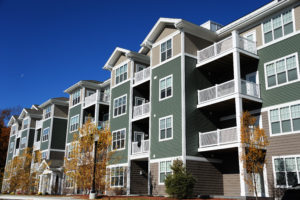 Property managers oversee a wide variety of facilities in Massachusetts, include residential, commercial, and mixed-use properties. Waste streams vary depending on whether your tenants are residents or businesses, but all of these property types generate some combination of waste ban materials such as cardboard, bottles and cans, and construction and demolition materials. As a property manager, you, your tenants, your waste hauler, and solid waste facilities are all responsible for complying with waste ban requirements. Read on to learn more about waste ban requirements, avoiding fines or fees, and tips on tenant compliance.
Property managers oversee a wide variety of facilities in Massachusetts, include residential, commercial, and mixed-use properties. Waste streams vary depending on whether your tenants are residents or businesses, but all of these property types generate some combination of waste ban materials such as cardboard, bottles and cans, and construction and demolition materials. As a property manager, you, your tenants, your waste hauler, and solid waste facilities are all responsible for complying with waste ban requirements. Read on to learn more about waste ban requirements, avoiding fines or fees, and tips on tenant compliance.
- Waste Ban Compliance Tips for Property Managers
- What are Waste Bans?
- Keep Recycling Clean
- Recycling Cardboard and Paper
- Recycling Bottles and Cans
- Collecting Mattresses and Textiles for Reuse and Recycling
- Diverting Food Waste from Disposal
- Diverting Leaf and Yard Waste from Disposal
- Recycling Construction and Demolition Materials and Large Appliances
- Other Common Challenging Materials
- How to Comply
Waste Ban Compliance Tips for Property Managers
To help property managers comply with Massachusetts Department of Environmental Protection (MassDEP) Waste Bans, RecyclingWorks developed the following sector-specific tip sheet, which serves as a summary of the information on this webpage:
![]()
![]()
![]() Waste Ban Compliance Tips for Property Managers
Waste Ban Compliance Tips for Property Managers
Waste Ban Compliance Tips for Property Managers [Español]
What are Waste Bans?
Many businesses and institutions are not aware that the MassDEP a bans number of materials from disposal in Massachusetts. Your municipality might have additional bylaws/ordinances or regulations requiring businesses and institutions to recycle. Property managers often have some responsibility for and control over recycling programs, especially when you contract directly with waste haulers for services, but you must both inform your tenants about the waste bans and rely on them to collect and sort the correct materials.
See the RecyclingWorks waste bans and compliance webpage for an overview on waste bans, as well as additional sector-specific tip sheets that have more customized information for certain types of commercial tenants, such as restaurants, retail operations, and food manufacturers and distributors.
Waste ban materials applicable to property managers, depending on whether your tenants are residential, commercial, or both, include:
- Cardboard
- Paper
- Glass, Metal, and Plastic Containers
- Commercial Food Waste (in excess of one ton per week)
- Leaf and Yard Waste
- Construction and Demolition Materials
- White Goods (most large appliances)
- Mattresses
- Textiles
See this MassDEP webpage for a full list of waste ban materials.
Even when a property manager offers recycling containers, multifamily, commercial, and mixed-use properties may receive MassDEP enforcement when recyclable materials are placed in the trash, as no person shall dispose, transfer for disposal, or contract for disposal or transport of the restricted materials. A number of common issues can result in recyclable materials being placed in the trash, including:
- Breakdown in staff and tenant participation
- Poor signage
- Miscommunication with haulers about what materials go in each collection container
- Collection containers not the right size
- Pickup schedule not properly set
- No backup plan for equipment failures
Property managers who don’t currently offer recycling for their tenants should speak with their trash hauler about adding additional services, or utilize the Find-a-Recycler tool to identify other service providers in their area.
Keep Recycling Clean
It is important to keep waste ban materials out of the trash, but it is also important to keep trash out of the recycling bin, as a hauler may reject or charge an additional fee for recycling that is contaminated. When in doubt, throw it out! Common contaminants in the recycling bin include:
- Food or liquid
- Plastic bags or plastic wrap
- Clothing or linens
- Other tanglers (such as wires or hoses)
Recycling should not be bagged when placed in the compacter or dumpster. Refer to the RecyclingWorks graphic on the best way to use plastic bag liners without contaminating the recycling stream.
MassDEP’s Recycle Smart MA initiative is a great resource to determine if a material should be placed in a mixed recycling container, recycled separately, or trashed.
Recycling Cardboard and Paper
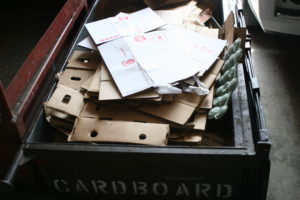 All recyclable paper, cardboard, and paperboard is banned from disposal, and more than 80% of all MassDEP waste ban enforcement is for cardboard! Clean cardboard is a readily recyclable material with well-established markets for processing, and is common for both commercial and residential tenants. Properties may also save money on disposal fees when collecting cardboard separately. See the RecyclingWorks cardboard webpage for information on how cardboard is recycled.
All recyclable paper, cardboard, and paperboard is banned from disposal, and more than 80% of all MassDEP waste ban enforcement is for cardboard! Clean cardboard is a readily recyclable material with well-established markets for processing, and is common for both commercial and residential tenants. Properties may also save money on disposal fees when collecting cardboard separately. See the RecyclingWorks cardboard webpage for information on how cardboard is recycled.
Material could be collected as cardboard only, cardboard mixed with paper, or single stream (cardboard, paper, and containers). Paper or cardboard that is contaminated with food or liquid waste should go in the trash. Businesses that collect food scraps for composting may be able to combine soiled paper, paperboard, cardboard, and waxed cardboard with the food waste. Consult with your hauler to find out if this is an option.
Recycling Bottles and Cans
Bottles and cans are also included in the MassDEP waste ban materials, and are often co-collected as part of a single stream recycling program at many residential and commercial properties in Massachusetts. This includes glass, plastic, and metal containers, bottles, jars, jugs, tubs, and cans. See the RecyclingWorks single stream and bottles and cans material webpages for additional information about recycling these items.
Collecting Mattresses and Textiles for Reuse and Recycling
On November 1 2022, the MassDEP added textiles and mattresses to the list of materials that are banned from disposal. Most textile material, including apparel, linens, and other fabrics, and mattress components, such as wood, scrap metal, and foam can be recovered for reuse, repurposing, or recycling. Contact RecyclingWorks for a customized list of reuse organizations, recyclers, and haulers in your area.
Textiles – It is important to collect and recover textiles separately, as they do not belong in recycling containers of any kind and can cause equipment damage and worker safety challenges at recycling facilities. For residential properties, consider facilitating monthly or seasonal donation collection pick-ups with a local organization. Some commercial tenants, such as clothing retailers, may also generate textiles. If your property includes multiple businesses that generate textiles, consider siting one or more collection containers for shared use.
Mattresses (including foundations or box springs) – There is a growing infrastructure for mattress recycling in Massachusetts, and many mattress recyclers offer pick-up services. Consider siting a closed or covered container, particularly if there is a season when your property has a large number of move-outs. Many Massachusetts municipalities offer mattress recycling programs, including drop-off options that residents of multifamily properties can access. These programs typically do not provide pick-up options for private multifamily properties.
Please note that the waste disposal ban does not include mattresses and textiles that are contaminated with mold, bodily fluids, insects, oil, or hazardous substances. See the MassDEP Waste Ban on Mattresses and Textiles – Frequently Asked Questions for more information about mattresses and textiles.
Diverting Food Waste from Disposal
 Food material can be the largest single component of waste generated by certain business tenants, and diverting this material from the trash may reduce disposal and overall operational costs. MassDEP established a commercial organics waste ban in October 2014. Effective November 1, 2022, this waste disposal ban requires all businesses and institutions that generate one half (½) ton or more of food waste per week to divert food material from disposal. Commercial tenants that are likely subject to this ban include:
Food material can be the largest single component of waste generated by certain business tenants, and diverting this material from the trash may reduce disposal and overall operational costs. MassDEP established a commercial organics waste ban in October 2014. Effective November 1, 2022, this waste disposal ban requires all businesses and institutions that generate one half (½) ton or more of food waste per week to divert food material from disposal. Commercial tenants that are likely subject to this ban include:
- Restaurants
- Food manufacturers & distributors
- Large offices with corporate cafeterias
- Supermarkets & grocery stores
- Lodging & hotels
- Event venues
Residential-only properties are exempt from the commercial organics ban.
If you have any commercial tenants that generate food waste, use the Food Waste Estimation Guide on the RecyclingWorks website to anticipate whether it is likely that your commercial tenants’ food waste exceeds the ban threshold.
Entities subject to the Massachusetts commercial organics waste ban must separate food scraps from trash and recycling. Food scrap collection strategies will vary based on a property’s available space, layout, and hauler requirements. In locations where patrons dispose of their own waste, offering consumers separate receptacles for solid organic waste, liquid waste (such as leftover soft drinks), recyclables (such as cans and bottles), and trash (such as plastic straws or wrappers) helps empower them to become part of the solution to wasted food. See the RecyclingWorks food waste material webpage for more information about the array of options available to recover food waste.
Diverting Leaf and Yard Waste from Disposal
If you are contracting for landscaping services, ask your contractor what they are doing with leaf and yard waste to ensure it is not going into the trash. Contractors or property managers who are not hauling leaf and yard waste for composting themselves should consider the following options:
- Check with your hauler(s) to see if they can provide a dedicated dumpster for collecting yard waste separately from trash and recyclables, or if they will collect yard waste by hand in piles.
- Ask your city or town whether they can pick up or accept dropped-off leaf and yard waste from your property for composting.
Properties that generate very small amounts of leaf and yard waste may want to designate an area on site to first consolidate the material until there is a large enough volume to warrant hauling off-site.
Recycling Construction and Demolition Materials and Large Appliances
Some of the common construction and demolition (C&D) materials generated from renovations, including unit turnover projects, are banned from disposal in Massachusetts. These include asphalt pavement, brick and concrete (ABC), untreated and clean wood, metal, and clean gypsum wallboard.
To comply with Massachusetts waste bans, make sure your hauler delivers C&D materials to a permitted C&D processing facility. To increase the overall recycling rate for a specific construction project, consider staging separate collection containers, rather than a mixed dumpster, for certain material types that are difficult to manage at C&D processing facilities, such as gypsum wallboard. See the RecyclingWorks C&D material webpage for additional information about managing C&D materials.
Residential unit renovations may also include white goods, such as refrigerators, gas or electric ovens and ranges, and clothes washers and dryers, which are also banned from disposal in Massachusetts. If the appliances are in good condition, they may be accepted for donation and reuse. Older white goods, or those that are no longer functional, may be recycled as scrap metal or may require special handling for their hazardous components. For example, cathode ray tube electronics are waste ban materials and require special handling as universal waste. When turning over a residential unit, consider prioritizing reuse by installing salvaged cabinets, vanities, and other materials.
Other Common Challenging Materials
There are additional non-waste ban items that often cause issues for property managers, particularly in residential properties. Many of these materials have reuse and recycling outlets. As a property manager it is helpful to provide and distribute information about connecting with local outlets, or consider developing a collection program on site for your tenants, for items such as:
- Furniture, and other reusable household goods – As recommended above for textiles, consider facilitating monthly or seasonal donation collection pick-ups with a local organization.
- Electronics (“e-waste”) – E-waste materials such as computers, smart phones, and other devices can be recycled at the end of their life. Consider facilitating a collection day and providing residents with information on local outlets.
- Household hazardous waste – Offer information on town-sponsored collection dates or other nearby outlets for proper disposal of paint, motor oil, chemicals, fluorescent lightbulbs, and mercury containing products.
The RecyclingWorks Find-a-Recycler tool can help you identify outlets for these materials.
How to Comply
To comply with Massachusetts waste bans and maintain successful waste diversion programs, it is important to communicate with your waste and recycling haulers and tenants.
Know Your Tenants’ Waste
You may not know exactly what materials are in your tenants’ trash bins. Take a look in your waste barrels and dumpsters to learn what waste ban items are regularly thrown away.
Communicate with Your Hauler
Talk to your waste hauler to find out options for adjusting your dumpsters/compactors so your tenants can recycle all waste ban materials. When you set up or improve your recycling program, you will likely be able to reduce the size or pickup frequency of your trash containers.
Recognize that it typically takes time to determine the right size containers. Talk with your hauler about container options for different waste streams, such as:
- Compactor
- Dumpster
- Baler
- Hand-picking
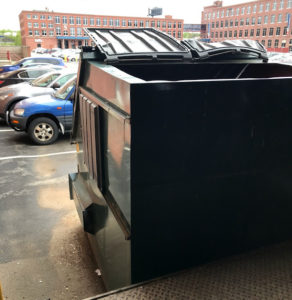
Carts are typically not the correct size or shape for collecting large volumes of cardboard. If you rely on equipment such as a baler or compactor for your recycling, talk with your hauler about backup plans to ensure that materials can continue to be recycled if equipment requires repair or replacement. For residential properties with a consistent move-in or move-out season, it may be helpful to site additional containers for trash, recycling, or bulky items at this time.
For more information, see the RecyclingWorks webpage on Equipment for Collecting Recycling, Organics, and Trash.
Request that your hauler provide you with direct and immediate feedback on waste ban materials observed in your trash containers, contamination in recycling loads, or when they receive notice about waste ban failed loads from solid waste facilities. This is particularly important if your property has a compactor or roll-off container, as drivers can observe and identify waste ban materials in these loads at the disposal site.
Set up Waste Collection Area(s) and Signage
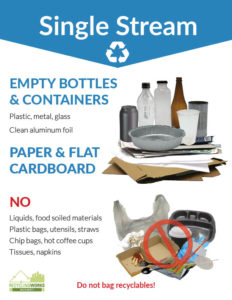 When setting up indoor and outdoor designated waste collection areas, group clearly labeled trash and recycling containers together in a reasonably convenient place to access, especially in public spaces such as lobbies, hallways, and sidewalks. If recycling contamination is a significant challenge, place the trash container in a slightly more convenient location than recycling so that engaged tenants can ‘opt-in’ to recycling programs. However, if it is significantly more difficult to locate or access recycling containers, you may also run the risk of banned materials being trashed. Clearly label all trash, recycling, and food waste containers. Customize these signs to include the specific needs and waste materials at your facility, including images of different materials. If many tenants are non-English speakers, translate the signage into the most commonly spoken language(s).
When setting up indoor and outdoor designated waste collection areas, group clearly labeled trash and recycling containers together in a reasonably convenient place to access, especially in public spaces such as lobbies, hallways, and sidewalks. If recycling contamination is a significant challenge, place the trash container in a slightly more convenient location than recycling so that engaged tenants can ‘opt-in’ to recycling programs. However, if it is significantly more difficult to locate or access recycling containers, you may also run the risk of banned materials being trashed. Clearly label all trash, recycling, and food waste containers. Customize these signs to include the specific needs and waste materials at your facility, including images of different materials. If many tenants are non-English speakers, translate the signage into the most commonly spoken language(s).
Consolidate and Move Waste Materials
The people who transport material to waste collection areas are key to the success of your waste diversion program and should be trained properly on how to move and where to bring different materials. It may be individual tenants, porters, or custodial staff who are responsible for this task. If you have custodial staff moving material instead of the tenants, you may have more control and understanding of which participants are disposing of waste ban materials. The following steps can help with staff or tenant training:
- Evaluate different levels of contamination and establish a consistent threshold for an acceptable amount of contamination in the recycling and food scraps collection.
- Work to break down any language, literacy, or scheduling barriers to communicating with the personnel that are so important to the success of your program.
- Check the dumpsters regularly for waste ban items and retrain as necessary.
Communicate with Your Tenants
As a property manager, your tenants are looking to you for guidance. Make lease agreement language clear and consistent, including the waste, recycling, and organics services offered by the property and any tenant expectations and responsibilities. Plan ahead and notify tenants how they will be responsible for complying with waste bans, and whether they may incur any potential fees for recycling contamination or waste ban violations. When tenants are moving out, provide additional information and signage, and consider monitoring collection areas to avoid illegal dumping and disposal of bulky items.
For all waste diversion programs, set and reinforce messaging using several strategies to ensure that materials are being properly diverted. Consider offering information in multiple languages if many tenants are not fluent English speakers. This may include:
- Move-in packets with trash and recycling information and maps of collection locations
- Touring waste areas with new tenants
- Tenant newsletters, workshops, or meetings
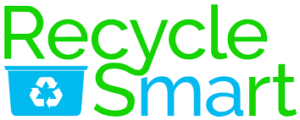 Property managers can utilize Recycle Smart MA educational tools and social media content to help improve the quality of recycling at their facilities. Include information for your tenants about the searchable Recyclopedia tool and Smart Recycling Guide. The Recycle Smart Partner Program is free to join and open to any organization that wants to play an active role in promoting better recycling in Massachusetts. Benefits include timely, informative content to use in recycling education efforts, updates on Massachusetts recycling markets, a Recycle Smart partner badge for your website, and access to embedding code to integrate the Recyclopedia search widget on your website.
Property managers can utilize Recycle Smart MA educational tools and social media content to help improve the quality of recycling at their facilities. Include information for your tenants about the searchable Recyclopedia tool and Smart Recycling Guide. The Recycle Smart Partner Program is free to join and open to any organization that wants to play an active role in promoting better recycling in Massachusetts. Benefits include timely, informative content to use in recycling education efforts, updates on Massachusetts recycling markets, a Recycle Smart partner badge for your website, and access to embedding code to integrate the Recyclopedia search widget on your website.
Property managers can give feedback to tenants if there is contamination in recycling or compost bins, or if there are waste ban materials in the trash, and tenants can offer suggestions when they encounter challenges. Designating an email address or comment box can allow residents to ask questions or make requests relating to recycling and waste diversion.
Webinar for Property Managers
RecyclingWorks and Recycle Smart held a Recycling 101 for Multifamily Property Managers webinar on June 3, 2020. Attendees learned how to comply with Massachusetts recycling regulations (aka Waste Bans), handle challenging materials, contract with haulers, and access free communication tools to help tenants become smarter recyclers.
View the webinar recording and slides to learn more.
Learn more about the following business sectors:
- Colleges and Universities
- Elementary and Secondary Schools
- Hospitality
- Health Care
- Offices
- Retail
- Restaurants
- Stadiums/Venues
- Supermarkets
RecyclingWorks in Massachusetts is a recycling assistance program that helps property managers and other businesses reduce waste and maximize recycling, reuse, and food recovery opportunities. Contact RecyclingWorks for customized assistance for your business, including how to:
- Start or improve recycling
- Comply with Massachusetts waste ban regulations
- Find haulers and processors of recyclable materials
- Provide employee training and signage
- Save money on waste removal
